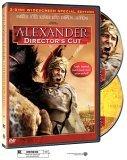
 Alexander
Alexander didn't do too well at the box-office last year, following a trend of historical epics in the last few years. Do bad box office figures translate to a poor movie? Not in the eye of this beholder.
Alexander - Director's Cut
is clearly a labour of love. It breaks many of the rules of film, simply because Oliver Stone wanted to make his tribute as historically accurate as possible.
After the mystical opening sequence, and some great music by Vangelis (suitably Greek!), we come upon a classroom. Rule number one - start with an action scene. The only action going on here is a geography lesson, much needed if you want to understand the point of the whole story. Unfortunately, geography lessons are as unpopular as ever with filmgoers.
Then, it's quite a long film, and being based (as much as possible) on a true story, its main character is very human, with flaws and strong points liberally scattered throughout his personality.
What do we do with Alexander? Should we admire him for his tenacity, courage and sweeping vision? Should we condemn him for his hubris, his short-sightedness? Should we chastise him for his moral habits, as seen through 21st century mores? Or should we sympathise with him, facing the ultimate broken family, where when mum and dad argued it literally meant someone could die?
We can do all of those things. What I think Stone is asking us to do most of all is to understand Alexander, and appreciate the role he plays in our history.
Ptolemy's geography lesson actually has a lot to say about how we interpret the movie. Because he's not talking so much about geography as he is wavering between nearly worshipping Alexander and cynically dismissing him. Everyone who watches Alexander will probably feel the same.
Make sure you listen to Oliver Stone's commentary. For a director's cut edition, I was expecting a lot more special features than the commentary, but a three-hour commentary is pretty good, and he's edited it so there are no lengthy gaps without commentary.
You can hear in Stone's commentary that he has lived and breathed this story since 1986. He knows ancient Greece, he knows wars, he knows strategy. As always, the story behind the story is almost as interesting. Listen to Oliver Stone talk about this his creation, and hear someone who loves what they do.
If it's leadership lessons you're after, there are plenty to be had on
Alexander - Director's Cut
. It's just that they don't get handed to you on a plate - you have to work out what each one means for you.





